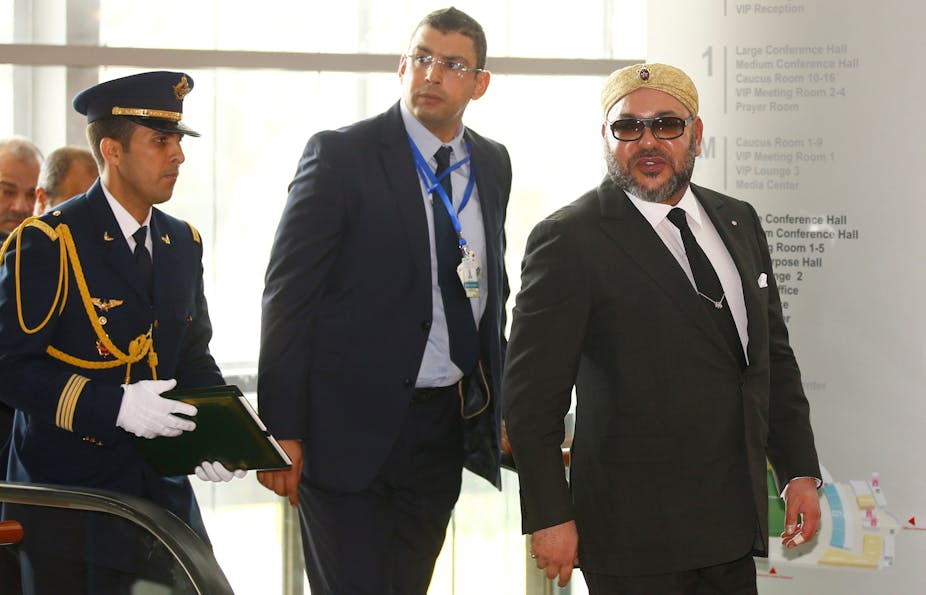Morocco’s admission to the African Union (AU) was a mistake. In one move, the AU squandered a chance to discourage the north African state’s aggression against Western Sahara. It also showed how the body struggles to enforce the implementation of its own standards and directives.
Morocco easily met the AU’s admission criteria. It’s geographically located within Africa and was voted in by more than a simple majority.
These are soft requirements, and they are a problem. The AU doesn’t make any real effort to determine whether applicants are genuine democracies before it admits them. No steps are taken to ascertain that an applicant state has the capacity to implement democratic policies and norms.
This isn’t the first time the AU has admitted a country to its ranks without due diligence. It took a mere 18 days from South Sudan’s independence to its admission into the AU. At the time South Sudan lacked even the most rudimentary physical and human infrastructure to implement AU rules. It has since become a burden to the union.
It’s time for the AU to look beyond geography and a simple majority vote. It must start demanding strict adherence to fundamental democratic values.
Morocco’s smooth ride
From the time Morocco submitted its application until its formal admission, the question of Western Sahara was swept aside.
The African Union has a poor disciplinary track-record. So there’s no guarantee that it will take any serious action against Morocco - beyond its ineffective suspension procedure - if it intensifies its aggression against Western Sahara.
The issue of Western Sahara aside, the AU has made no effort to assess the ability of Morocco’s domestic institutions to implement the union’s democratic and economic policies. Had the AU subjected Morocco to a proper due diligence exercise, it would have found that its occupation of Western Sahara violates the principles stipulated in articles 3 & 4 of the AU’s Constitutive Act which are territorial integrity, respect of borders, and non-interference in the internal affairs of a member state.
In addition, the AU would have found that the Moroccan government is notorious for forcing dissidents serve long prison terms after unfair trials for purely political reasons.
The consequences of lax admission rules
The failure to consider democratic values as part of the AU’s admission process continues to have a number of negative effects. The absence of strict pre-conditions for membership has made it difficult for the union to manage errant behaviour among member states.
Member states not only routinely disregard the AU’s basic democratic norms, they have also refused to agree on a common understanding of these norms.
Even in cases where AU organs have recommended sanctions for serious violations of human rights, as in the case of Burundi, some member states refused to vote in favour of collective military intervention.
Member states have shown a reluctance to strengthen the democratic functions of the AU. And, there’s no common position on how to move the union beyond the rhetorical plane.
With a strict pre-admission process, issues of compliance with AU rules and regulations could be easily determined, and the necessary measures to address violations adapted.
Which way forward?
It’s not naive or idealistic to suggest that the AU needs stricter admission criteria. The union has strong democratic foundations which are espoused in the Constitutive Act.
These were the democratic values championed by African states as the union transitioned from the Organisation of African Unity in the year 2000.
That little attention has been paid to upholding the continental organisation’s democratic ethos remains one of the key drawbacks of the AU.
It missed the opportunity to push its democratic agenda during the processes that admitted first South Sudan and then Morocco. Thankfully, the AU can still redress this position by amending its Constitutive Act for future applications.
I am proposing a fourth condition for admission: the strict adherence to democratic norms as stipulated in articles 3 & 4 of the Constitutive Act.
The prospect of enlarging the AU to include the African Diaspora presents the union with an opportunity to enforce a stricter admission process. Haiti is likely to apply again for AU membership and if it’s admitted this could open the door for other countries in the Caribbean and Latin America.
If this happens, then the AU should subject each applicant state to a process that assesses its ability and willingness to comply with the union’s democratic norms, the likely obstacles to that compliance, and the feasibility of assisting the applicant state to redress its democratic shortfalls.
That could ideally be done through a strengthened African Peer Review Mechanism. Such process should be tailored to assess the political and economic readiness of an applying state to fulfil AU obligations.

